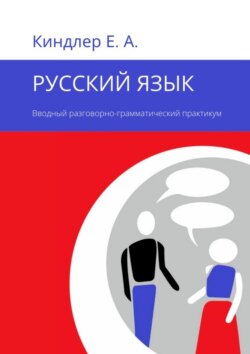Читать книгу Русский язык. Вводный разговорно-грамматический практикум - Евгений Александрович Рекин, Степан Петрович Мамонтов, Евгений Александрович Ларин - Страница 3
Урок 1. Род существительных. Национальность. Lesson 1. Gender of nouns. Nationality
ОглавлениеThe pronoun ты is used in addressing children, members of the speaker’s own family or his close friends. The pronoun вы (Вы) can be used with respect to one person or several persons:
Как тебя (Вас) зовут? – What is your name?
Упражнение 1
What is your name
Меня зовут…
Упражнение 2
Meet and introduce your friends. Use expressions его/её зовут…
Диалоги:
– Привет. Меня зовут Саша. А тебя как зовут?
– Меня зовут Лена.
– Я очень рад1 познакомиться.
– Я тоже рада познакомиться.
– Здравствуйте. Меня зовут Иван. А вас как зовут?
– Меня зовут Сергей.
– Очень приятно познакомиться!
– Мне тоже очень приятно!
Упражнение 3
Write in Russian your name and surname. Spell your name so your friend writes it down. In Russian, the first name is pronounced, and then the last name.
In the official styles, the patronymic (father’s name) is also used together with the name. For example, Alexander (name) Sergeyevich (patronymic) Pushkin (last name). There are also full and short names. In an informal style, short ones are most often used.
For example, Elena/Lena, Ivan/Vanya, Yelizaveta (Elizabeth) /Lisa. Almost all male names in full form end with a consonant (exception, Nikita, Ilya), female with «a» or «я» vowels (exception Lyubov’). Several names can be used for both men and women. For example, Alexander/Alexandra, Eugeniy (Eugene) /Eugenia, Valery/Valeria
Упражнение 4.
Indicate whose name is male or female. Полина Олеся Алексей Ксения Валентина Анатолий Екатерина Елена Андрей Юлия Яна Антон Артем Оксана Вадим Валентин Анна Валерий Василий Виктор Виталий Владимир Вячеслав Людмила Маргарита Геннадий Клавдия Георгий Ольга Григорий Даниил Денис Дмитpий Евгений Александра Егор Любовь Иван Игорь Илья Кирилл Алина Алла Анастасия Максим Наталья Нина Михаил Вероника Виктория Никита Карина Николай Олег Галина Дарья
Names of countries in Russian are consonant with their names in European languages. Note that the nationalities of men end with a consonant (the majority has an ending – ец), women with vowels (the ending is -ка). The plural has endings ы or и.
Упражнение 5. What is your nationality?
Например,
– Я русский.
– Я русская.
Упражнение 6. Introduce your friends by composing similar dialogues
Упражнение 7. Find the meaning of the following words in the dictionary
Запомните:
Упражнение 8. Determine the gender of these words
Russian nouns have gender. There are three genders: masculine, feminine and neuter. The gender of animated nouns (persons or animals) is generally determined by their sex. The gender of unanimated nouns can be discerned only by endings:
masculine – consonant or й
дом, музей,
feminine — а, я
страна, фамилия,
neuter – о, е
окно, упражнение
Note. – Nouns with – ь may be either masculinte or feminine. The ending must be memorized
словарь, преподаватель – masculine
национальность, тетрадь – feminine
Упражнение 9. Write the five items you have
In Russian there is a verb «быть» (to be). Derivative of it is «есть», but it is not used as in English. They speak Russian without using the verb «to be» in sentences like «I’m a student», «I’m Russian»: я студент, я русский, not «я есть студент».
«Есть» is used to express the idea of possession. It refers to «to have» in combination with the preposition у and personal pronoun in the indirect case.
1
In Russian, the word рад is used by men, the word рада is used by women
